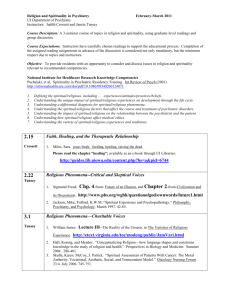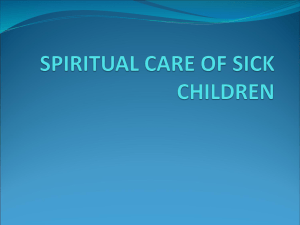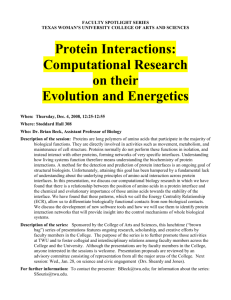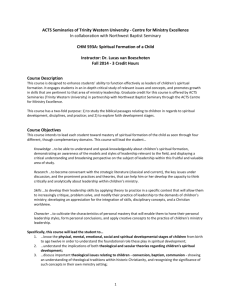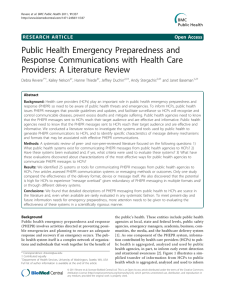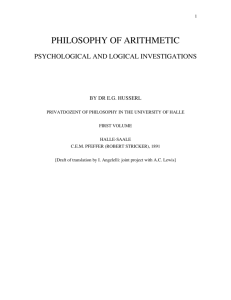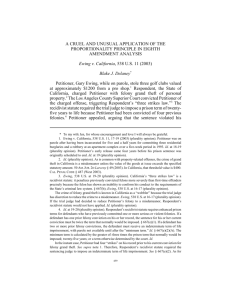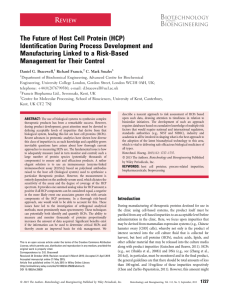Read more
advertisement
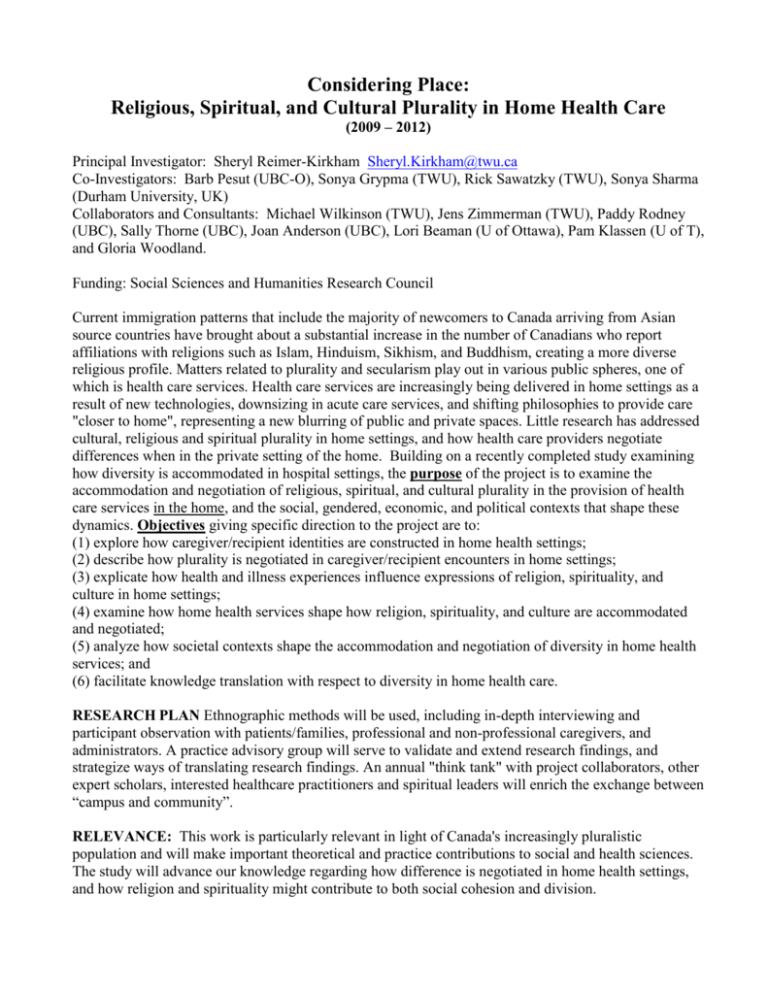
Considering Place: Religious, Spiritual, and Cultural Plurality in Home Health Care (2009 – 2012) Principal Investigator: Sheryl Reimer-Kirkham Sheryl.Kirkham@twu.ca Co-Investigators: Barb Pesut (UBC-O), Sonya Grypma (TWU), Rick Sawatzky (TWU), Sonya Sharma (Durham University, UK) Collaborators and Consultants: Michael Wilkinson (TWU), Jens Zimmerman (TWU), Paddy Rodney (UBC), Sally Thorne (UBC), Joan Anderson (UBC), Lori Beaman (U of Ottawa), Pam Klassen (U of T), and Gloria Woodland. Funding: Social Sciences and Humanities Research Council Current immigration patterns that include the majority of newcomers to Canada arriving from Asian source countries have brought about a substantial increase in the number of Canadians who report affiliations with religions such as Islam, Hinduism, Sikhism, and Buddhism, creating a more diverse religious profile. Matters related to plurality and secularism play out in various public spheres, one of which is health care services. Health care services are increasingly being delivered in home settings as a result of new technologies, downsizing in acute care services, and shifting philosophies to provide care "closer to home", representing a new blurring of public and private spaces. Little research has addressed cultural, religious and spiritual plurality in home settings, and how health care providers negotiate differences when in the private setting of the home. Building on a recently completed study examining how diversity is accommodated in hospital settings, the purpose of the project is to examine the accommodation and negotiation of religious, spiritual, and cultural plurality in the provision of health care services in the home, and the social, gendered, economic, and political contexts that shape these dynamics. Objectives giving specific direction to the project are to: (1) explore how caregiver/recipient identities are constructed in home health settings; (2) describe how plurality is negotiated in caregiver/recipient encounters in home settings; (3) explicate how health and illness experiences influence expressions of religion, spirituality, and culture in home settings; (4) examine how home health services shape how religion, spirituality, and culture are accommodated and negotiated; (5) analyze how societal contexts shape the accommodation and negotiation of diversity in home health services; and (6) facilitate knowledge translation with respect to diversity in home health care. RESEARCH PLAN Ethnographic methods will be used, including in-depth interviewing and participant observation with patients/families, professional and non-professional caregivers, and administrators. A practice advisory group will serve to validate and extend research findings, and strategize ways of translating research findings. An annual "think tank" with project collaborators, other expert scholars, interested healthcare practitioners and spiritual leaders will enrich the exchange between “campus and community”. RELEVANCE: This work is particularly relevant in light of Canada's increasingly pluralistic population and will make important theoretical and practice contributions to social and health sciences. The study will advance our knowledge regarding how difference is negotiated in home health settings, and how religion and spirituality might contribute to both social cohesion and division. Recommendations will be developed regarding how to best create space for the expression of religious and spiritual plurality when health and social services are provided in home settings. SETTING, SAMPLE & RECRUITMENT: The study will be conducted in home settings. Patients and healthcare providers (HCPs) will be recruited through three Home Health offices serving diverse communities in Fraser Health Authority. Purposive sampling will be used to obtain a sample of 20 - 25 professional and non-professional healthcare providers (HCPs), 15 - 20 patients, and 7-10 administrators/decision makers. Diversity will be sought among patients and HCPs for a range of religious, spiritual, and cultural affiliations including various Christian denominations, Judaism, Sikhism, Islam, Buddhism, and those with no formal religious ties. After significant proportions of the data have been analyzed, theoretical sampling will be used to seek participants who can explore relevant concepts and insights arising from the data. Inclusion criteria for HCPs: a) health care provider (professional or non-professional) and b) provides health care services in home settings. Inclusion criteria for patients: a) age 18 or over; b) no known cognitive impairment, c) stable health condition, and (d) requiring home health services. In the event that participants are non-English speaking, translation services will be sought from an independent community service. Recruitment of HCPs will be facilitated by orienting staff to the project at three selected home health offices. Information about the study will be provided to staff during staff meetings, and informational pamphlets will be posted on the units. Those who agree to participate will be asked to provide written consent to participate in observation and interviews. The terms of consent will be reviewed regularly throughout the study to ensure participants are participating voluntarily. Recruitment of patients will occur during observational sessions as the researchers buddy with participating HCPs. They will be given an informational pamphlet by the HCP, and the researcher will then approach the patient to explain the study and seek his/her written consent to participate in an interview and to have the researcher observe recipient-provider encounters. DATA COLLECTION: Study objectives and research questions form the framework for data collection (via PO and semi-structured interviews) and analysis. Researchers will ―buddy with the HCP for two or three episodes of field work (typically lasting 3 – 4 hours) to observe interactions with patients/ families who have consented. Interviews lasting 30 – 60 minutes and guided by ―trigger questions will be conducted following these periods of PO. Patient participants will be interviewed at a time convenient to them regarding their interpretations of spirituality and religiosity, and their experiences of receiving care at home. Administrators/decision-makers will be interviewed in a location convenient to them, again based upon an interview guide. With permission, interviews will be audiorecorded and transcribed. This method of field work has been used to yield rich, contextualized data in our previous SPIRIT project. Extensive reflexive field notes will be written following each episode of fieldwork. Data collection will also include reviewing relevant public and organizational policies.



